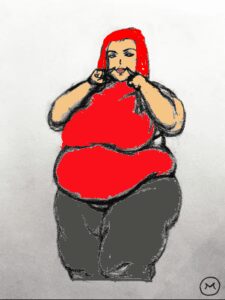The margin of the manuscript bore as motto a variation of the well-known lines from Faust:
“Thou supersensual sensual wooer
A woman leads you by the nose.”
—MEPHISTOPHELES.
I turned the title-page and read: “What follows has been compiled from my diary of that period, because it is impossible ever frankly to write of one’s past, but in this way everything retains its fresh colors, the colors of the present.”
Gogol, the Russian Molière, says—where? well, somewhere—“the real comic muse is the one under whose laughing mask tears roll down.”
A wonderful saying.
So I have a very curious feeling as I am writing all this down. The atmosphere seems filled with a stimulating fragrance of flowers, which overcomes me and gives me a headache. The smoke of the fireplace curls and condenses into figures, small gray-bearded kokolds that mockingly point their finger at me. Chubby-cheeked cupids ride on the arms of my chair and on my knees. I have to smile involuntarily, even laugh aloud, as I am writing down my adventures. Yet I am not writing with ordinary ink, but with red blood that drips from my heart. All its wounds long scarred over have opened and it throbs and hurts, and now and then a tear falls on the paper.
The days creep along sluggishly in the little Carpathian health-resort. You see no one, and no one sees you. It is boring enough to write idyls. I would have leisure here to supply a whole gallery of paintings, furnish a theater with new pieces for an entire season, a dozen virtuosos with concertos, trios, and duos, but—what am I saying—the upshot of it all is that I don’t do much more than to stretch the canvas, smooth the bow, line the scores. For I am—no false modesty, Friend Severin; you can lie to others, but you don’t quite succeed any longer in lying to yourself—I am nothing but a dilettante, a dilettante in painting, in poetry, in music, and several other of the so-called unprofitable arts, which, however, at present secure for their masters the income of a cabinet minister, or even that of a minor potentate. Above all else I am a dilettante in life.
Up to the present I have lived as I have painted and written poetry. I never got far beyond the preparation, the plan, the first act, the first stanza. There are people like that who begin everything, and never finish anything. I am such a one.
But what am I saying?
To the business in hand.
I lie in my window, and the miserable little town, which fills me with despondency, really seems infinitely full of poetry. How wonderful the outlook upon the blue wall of high mountains interwoven with golden sunlight; mountain-torrents weave through them like ribbons of silver! How clear and blue the heavens into which snowcapped crags project; how green and fresh the forested slopes; the meadows on which small herds graze, down to the yellow billows of grain where reapers stand and bend over and rise up again.
The house in which I live stands in a sort of park, or forest, or wilderness, whatever one wants to call it, and is very solitary.
Its sole inhabitants are myself, a widow from Lemberg, and Madame Tartakovska, who runs the house, a little old woman, who grows older and smaller each day. There are also an old dog that limps on one leg, and a young cat that continually plays with a ball of yarn. This ball of yarn, I believe, belongs to the widow.
She is said to be really beautiful, this widow, still very young, twenty-four at the most, and very rich. She dwells in the first story, and I on the ground floor. She always keeps the green blinds drawn, and has a balcony entirely overgrown with green climbing-plants. I for my part down below have a comfortable, intimate arbor of honeysuckle, in which I read and write and paint and sing like a bird among the twigs. I can look up on the balcony. Sometimes I actually do so, and then from time to time a white gown gleams between the dense green network.
Really the beautiful woman up there doesn’t interest me very much, for I am in love with someone else, and terribly unhappy at that; far more unhappy than the Knight of Toggenburg or the Chevalier in Manon l’Escault, because the object of my adoration is of stone.
In the garden, in the tiny wilderness, there is a graceful little meadow on which a couple of deer graze peacefully. On this meadow is a stone statue of Venus, the original of which, I believe, is in Florence. This Venus is the most beautiful woman I have ever seen in all my life.
That, however, does not signify much, for I have seen few beautiful women, or rather few women at all. In love too, I am a dilettante who never got beyond the preparation, the first act.
But why talk in superlatives, as if something that is beautiful could be surpassed?
It is sufficient to say that this Venus is beautiful. I love her passionately with a morbid intensity; madly as one can only love a woman who never responds to our love with anything but an eternally uniform, eternally calm, stony smile. I literally adore her.
I often lie reading under the leafy covering of a young birch when the sun broods over the forest. Often I visit that cold, cruel mistress of mine by night and lie on my knees before her, with the face pressed against the cold pedestal on which her feet rest, and my prayers go up to her.
The rising moon, which just now is waning, produces an indescribable effect. It seems to hover among the trees and submerges the meadow in its gleam of silver. The goddess stands as if transfigured, and seems to bathe in the soft moonlight.
Once when I was returning from my devotions by one of the walks leading to the house, I suddenly saw a woman’s figure, white as stone, under the illumination of the moon and separated from me merely by a screen of trees. It seemed as if the beautiful woman of marble had taken pity on me, become alive, and followed me. I was seized by a nameless fear, my heart threatened to burst, and instead—
Well, I am a dilettante. As always, I broke down at the second stanza; rather, on the contrary, I did not break down, but ran away as fast as my legs would carry me.
* * * * *
What an accident! Through a Jew, dealing in photographs I secured a picture of my ideal. It is a small reproduction of Titian’s “Venus with the Mirror.” What a woman! I want to write a poem, but instead, I take the reproduction, and write on it: Venus in Furs.
You are cold, while you yourself fan flames. By all means wrap yourself in your despotic furs, there is no one to whom they are more appropriate, cruel goddess of love and of beauty!—After a while I add a few verses from Goethe, which I recently found in his paralipomena to Faust.







